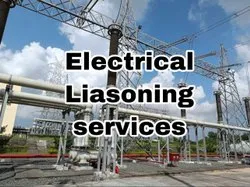Laisioning work for Electrical projects

Liaisoning Work in Electrical Projects Across Maharashtra: Mumbai, Navi Mumbai, Nagpur, Nashik, Thane, Pune & Aurangabad
Liaisoning work is a crucial component of electrical projects, ensuring regulatory compliance, permit acquisition, and smooth coordination between multiple stakeholders. In Maharashtra’s rapidly growing cities—Mumbai, Navi Mumbai, Nagpur, Nashik, Thane, Pune, and Aurangabad—successful electrical projects require efficient liaisoning with government bodies, utility providers, and contractors to ensure timely approvals and smooth execution. Here’s a detailed description:
Key Components of Liaisoning Work in Electrical Projects:
Regulatory Compliance:
- Understanding and complying with local, regional, and national electrical codes and regulations.
- Ensuring the project adheres to safety standards and environmental guidelines.
Permits and Approvals:
- Applying for and obtaining necessary permits from government bodies (e.g., construction permits, electrical permits).
- Securing approvals from utility companies for connections to the power grid.
Coordination with Authorities:
- Engaging with local municipalities, building inspectors, and utility providers.
- Scheduling inspections and addressing any issues raised by authorities.
Documentation and Reporting:
- Preparing and submitting required documentation, such as project plans, technical specifications, and compliance reports.
- Maintaining records of all communications, approvals, and permits for future reference.
Stakeholder Communication:
- Acting as the primary point of contact between the client, contractors, and regulatory bodies.
- Facilitating meetings and discussions to resolve any issues or conflicts.
Project Management Support:
- Assisting in project scheduling and planning to ensure timely completion of liaisoning tasks.
- Monitoring the progress of the project to identify and address any delays or obstacles related to approvals and permits.
Steps in Liaisoning Work:
Initial Planning and Research:
- Identifying all necessary permits, approvals, and clearances required for the project.
- Researching regulatory requirements and establishing contact with relevant authorities.
Application Submission:
- Preparing and submitting applications for permits and approvals.
- Ensuring all required documents and supporting materials are complete and accurate.
Follow-Up and Negotiation:
- Following up with authorities to track the status of applications.
- Addressing any queries or concerns raised by regulatory bodies and negotiating terms if necessary.
Inspection Coordination:
- Scheduling and coordinating inspections by regulatory authorities.
- Ensuring the project site is prepared for inspections and that any issues identified are promptly addressed.
Final Approvals and Certification:
- Obtaining final approvals and certifications upon the completion of inspections and compliance checks.
- Ensuring all legal and regulatory requirements are met before the project is commissioned.
Expert Liaisoning Work for Electrical Projects in Maharashtra & Key Cities
Liaisoning work is a crucial aspect of executing electrical projects, ensuring compliance with government regulations, securing necessary permits, and coordinating with relevant authorities. Whether for industrial, commercial, or residential developments, professional liaisoning services help streamline approvals, minimize delays, and maintain regulatory adherence. Below are key cities in Maharashtra where expert liaisoning services for electrical projects are provided.
Liaisoning Work for Electrical Projects in Maharashtra
Liaisoning Work for Electrical Projects in Maharashtra, being a major industrial and commercial hub, requires extensive liaisoning services for electrical projects. Professionals assist in obtaining permits from municipal corporations, coordinating with Maharashtra State Electricity Distribution Co. Ltd. (MSEDCL), and ensuring compliance with electrical safety norms for various infrastructure projects.
Liaisoning Work for Electrical Projects in Pune
Pune’s thriving industrial, IT, and educational sectors require seamless electrical approvals. Liaisoning work for electrical projects in Pune involves coordination with Pune Municipal Corporation, MIDC, and power distribution authorities to secure necessary clearances for commercial complexes, IT parks, and factories.
Liaisoning Work for Electrical Projects in Mumbai
Mumbai, a financial and commercial powerhouse, demands extensive liaisoning services for electrical installations in high-rise buildings, corporate offices, and infrastructure projects. Liaisoning work for electrical projects in Mumbai includes securing approvals from Brihanmumbai Municipal Corporation (BMC) and managing electrical permits for large-scale developments.
Liaisoning Work for Electrical Projects in Navi Mumbai
Navi Mumbai, a rapidly growing urban and industrial hub, requires well-coordinated electrical liaisoning for its IT parks, SEZs, and commercial buildings. Liaisoning work for electrical projects in Navi Mumbai includes working with CIDCO to ensure smooth infrastructure development and power distribution setup.
Liaisoning Work for Electrical Projects in Nashik
Nashik’s agro-industrial and manufacturing sectors require meticulous electrical approvals. Liaisoning work for electrical projects in Nashik involves ensuring compliance with MSME electrical safety norms, obtaining industrial power supply permits, and facilitating grid connections for factories and agricultural processing units.
Liaisoning Work for Electrical Projects in Thane
Thane’s expanding real estate and commercial developments necessitate efficient liaisoning services. Liaisoning work for electrical projects in Thane includes engaging with municipal authorities for residential and commercial electrification, securing approvals for sustainable energy solutions, and ensuring compliance with urban infrastructure regulations.
Liaisoning Work for Electrical Projects in Nagpur
Nagpur, a crucial logistics and industrial center, requires specialized electrical approvals for large warehouses, manufacturing units, and SEZs. Liaisoning work for electrical projects in Nagpur includes coordinating with MSEDCL for industrial power supply and obtaining permits for logistics sector electrification.
Liaisoning Work for Electrical Projects in Aurangabad
Aurangabad, a key hub for automobile and pharmaceutical industries, relies on efficient electrical liaisoning to support manufacturing operations. Liaisoning work for electrical projects in Aurangabad involves managing permits for industrial electrification, ensuring compliance with environmental safety standards, and obtaining approvals for energy-intensive industries.
Importance of Liaisoning Work:
- Compliance: Ensures the project adheres to all legal and regulatory standards, preventing potential legal issues and fines.
- Safety: Facilitates adherence to safety standards, reducing the risk of accidents and hazards.
- Efficiency: Streamlines the approval process, reducing delays and keeping the project on schedule.
- Communication: Enhances communication between all parties, fostering cooperation and collaboration.
- Reputation: Helps maintain a positive relationship with regulatory authorities and stakeholders, enhancing the reputation of the involved parties.
Key Skills and Attributes for Liaisoning:
- Attention to Detail: Ensuring all documentation is accurate and complete.
- Communication Skills: Effectively conveying information and facilitating discussions between stakeholders.
- Negotiation Skills: Addressing concerns and negotiating terms with regulatory bodies.
- Project Management: Coordinating tasks and managing timelines to ensure timely approvals.
- Knowledge of Regulations: Staying updated with the latest electrical codes, standards, and regulatory requirements.
Liaisoning work is essential for the successful execution of electrical projects, ensuring compliance with regulations, efficient project progress, and effective stakeholder communication.
